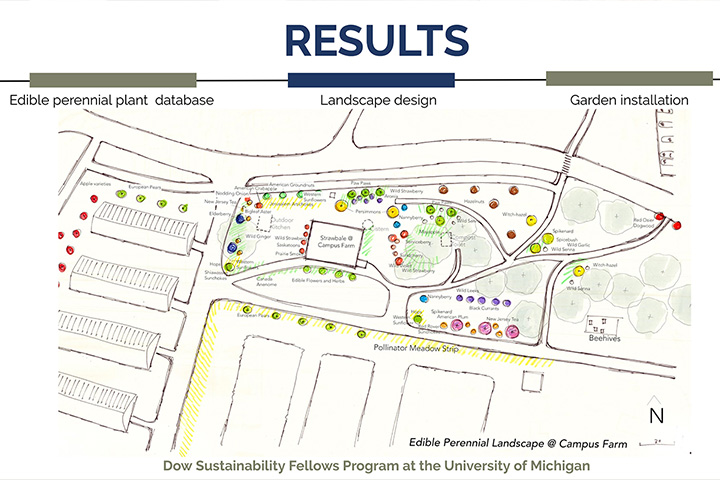Building Community Through Sustainable Food
Building Community Through Sustainable Food
Building Community Through Sustainable Food
Program: Dow Sustainability Fellows Program
Program details » | All Dow Sustainability Fellows Program projects »

Spotlight on Southeast Michigan

The University of Michigan’s Campus Farm helps create a sustainable food system at U-M by growing produce for dining halls across campus. This Dow Fellows team deepened the Campus Farm’s commitment to indigenous foods by designing and planting an edible landscape of indigenous trees, shrubs, and herbaceous plants. The new perennial garden serves as a living land acknowledgment, reflecting contemporary and ancestral ties to the lands and celebrating indigenous contributions to the university. Student farmers will tend and harvest the crops—20 in total—to incorporate indigenous ingredients into Michigan Dining cuisine for all U-M students to enjoy. (Client: U-M Campus Farm at Matthaei Botanical Gardens)
“We partnered closely with Matthaei staff—who have worked with Tribal Nations representatives for years around seed rematriation—for guidance, cultural sensitivity, and personal contacts.”
(Dow Fellows Program 2019)
Healthy and sustainable local food systems foster a productive and functional global food system. A Dow Sustainability Fellows team looked into two key aspects of the food system. One part of this project focused on ethnobotany and edible perennial landscape in partnership with the U-M Campus Farm. The second part of this project focused on addressing food insecurity. About 12% of American households experience food insecurity. At the University of Michigan, a staggering 32% of students are food insecure. Working with the U-M Campus farm, the Dow Fellows team created the Maize and Blue Cupboard Donation Garden to provide locally-grown produce to the Maize and Blue Cupboard, U-M’s food pantry.
Location: Ann Arbor, Michigan
Project Advisor: Jeremy Moghtader
Project Team: Zoe Fullem, School for Environment and Sustainability (SEAS); Savannah Boerger, School of Public Health; Dany Zemmel, School of Public Health; Katharine Asta, School of Medicine and School of Public Health; Brooke Callaghan, School of Public Health; Katharine Shiffler, SEAS
Project Consultant: Elizabeth LaPorte